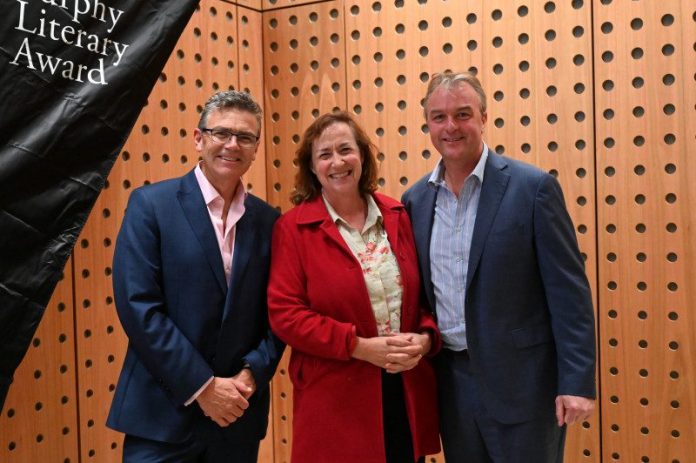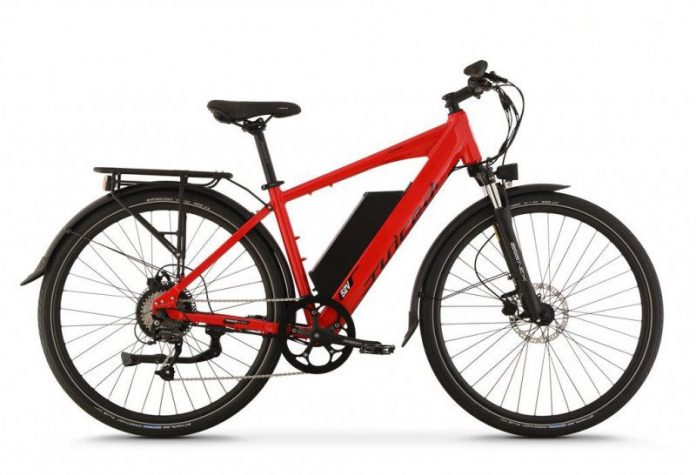Castlemaine Landcare Group is inviting anyone and everyone to roll up their sleeves and be part of this Sunday’s big community planting event marking National Tree Day.
National Tree Day is this Sunday July 31 and to mark it in style the local landcare group is aiming to get between 1500 and 2000-plus plants into plots they have especially prepared alongside Castlemaine’s Moonlight Creek.
The Landcare group’s president Christine Kilmartin says the family-friendly outdoorsy event will take place between 10am – 1pm.
Besides the planting of numerous native plants especially selected for the site, it will also include a free barbecue lunch cooked by the Castlemaine Lions Club, with some vegan-friendly options available as well.
“This site was old gold mining and then farming, and it’s a hard site to work to get back but in the long run it’s starting to look terrific,” the landcare group president says.
Restoration of biodiversity is a big focus with many low growing plants and grasses going in, along with “a small clump of trees” in an effort to enhance habitat for small birds that feed on grass seeds.
“We’ve already got a lot of trees planted,” notes Christine, ahead of this Sunday’s event which promises to be a warming and sociable way to spend National Tree Day.
“I would suggest rugging up and wearing boots,” Christine says.
Sunday’s big planting event is part of the landcare group’s ongoing work to strengthen the Moonlight Creek vegetation corridor from Forest Creek to Kalimna Park under a Victorian Landcare Grant through the North Central Catchment Management Authority.
Sunday’s National Tree Day planting site is accessible from Happy Valley Road with a map and further details available via the Castlemaine Landcare Group’s Facebook page and website – with COVID safety protocols to be followed.
Planet Ark’s National Tree Day started in 1996 and has grown into Australia’s largest community tree planting and nature care event with the Friends of Campbells Creek Landcare Group and Elphinstone Creek Care also registering planting events for people to join.
Plant a tree for National Tree Day: Castlemaine Landcare to host big public planting event
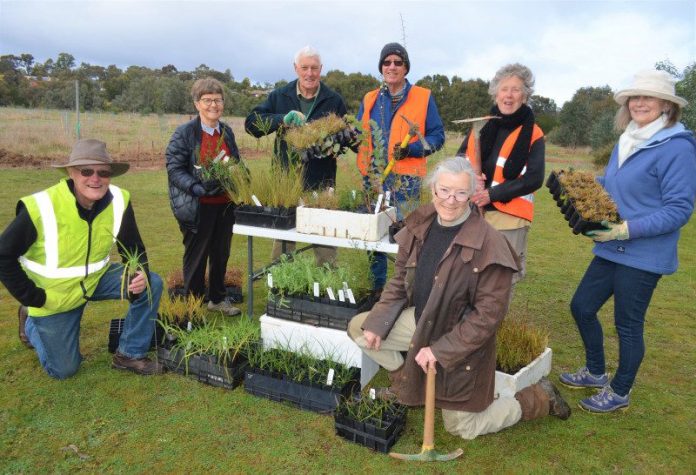
Safety concerns raised over Faraday truck depot ‘still operating without a permit’
Faraday residents are raising questions over the continued operation of a truck depot despite it having not yet obtained council planning approval, amid fears it’s causing costly road damage and is placing local lives at risk.
Using public question time during last week’s Mount Alexander Shire Council meeting two local residents made separate appearances before the council to raise their concerns about the way in which the Faraday depot has been allowed to continue operating without having gained planning approval.
One long-time Faraday resident called for clarification “as to why the applicant for a truck depot, proposed and currently operating without a permit in Ellerys Road, Faraday, has recently been given yet another extension to provide information to the planning department thus extending the time they may operate without a permit”.
“The council asked them to provide a planning application approximately one-and-a-half years ago,” she told councillors at last week’s July council meeting.
“The business has been operating for years. My family and other objectors to the permit application have expressed many times the concern we have about firstly, the safety of utilising Ellerys Road regularly for large trucks, including B-doubles, and secondly, the extreme wear and tear on the deteriorating gravel road that council has to continually maintain at ratepayers’ expense.
“Could you please explain why a further extension has been given and why the applicant continues to operate without a permit?”
Another local resident who raised concerns said the operation of the depot was “a major safety issue”.
“I don’t understand why you have let them conduct a business for three years plus without a permit,” he said, addressing the council during public question time.
“It destroys the road… A B-double going one way and a resident coming the other is an accident waiting to happen,” he told councillors.
The council’s Director of Infrastructure and Development Michael Annear said the extension had been granted to the end of August after which time the application was expected to go before the council for a decision in September with an objectors’ meeting also scheduled to take place in early September.
“The extension has been granted to complete the collection of information that’s requested by council officers to help put forward a recommendation to council which will then be taken to the council meeting,” Mr Annear said.
Mayor Cr Bill Maltby stated “you can be assured that in September council will make a decision”.
My Castlemaine: HR manager, Rotarian and tap dancer, Lyn Ellery
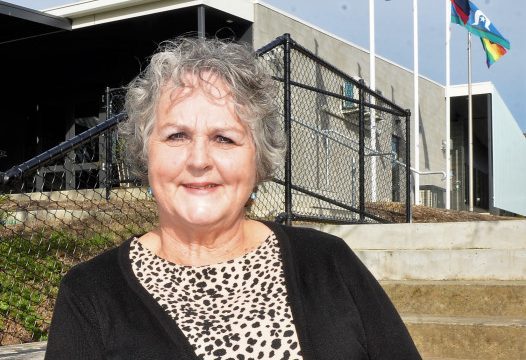
G’day Lyn. Well I’m here talking to you at Castlemaine Secondary College where you work. What is it you do here?
I’m HR manager.
That sounds demanding.
It can be. But I like my job. It’s good. There’s never a dull moment. It’s always busy.
How long have you lived in this local community Lyn? You are a Castlemaine resident aren’t you?
Yes. I’ve lived here all my life. Grew up at Harcourt North and then moved to Castlemaine, and I live at Campbells Creek now. So I’ve been in this district all my life.
And you are also very well known here through your work with Castlemaine Rotary where, up until very recently, you were club president weren’t you?
I was president but that finished on June 30th, so now I’m community director. I’m still involved on the board and doing things to support the community in different ways. We get submissions from community groups for funding support with events or barbecues and it’s just coordinating those. We meet once a month as the board and then we go through what we’ve received for the month and decide how we will support the groups.
How long have you been a member of Rotary?
Eight years.
What drives you to contribute that sort of commitment?
I like to be busy. I think we should give back to the community. The community supports us in our work and our living. There’s lots of needy groups out there that need support and it’s good to be part of a group that has the same drive to support the community and I really enjoy Rotary.
Right. It’s quite social as well isn’t it? A good way to make some new friends?
Yes. It’s a great group of people. One of the members has organised a train trip to Maldon – the Murder on the Orient Express run. We’ve been given a special night just for Rotary.
Sounds like fun. Will you all be in period costume?
Well we can be. Yes. We do lots of social things.
And the art show that Rotary recently staged raised a lot of money didn’t it?
Yes. It was about $20,000. It will go towards the community events that we support and then we do support overseas things as well.
It’s polio eradication that Rotary focuses on isn’t it?
Yes. That’s Rotary’s thing. There’s only one or two cases in the world now.
Any other community involvements for you Lyn, besides Rotary?
I’m treasurer of the Castlemaine Uniting Church. I have been that for about eleven years. I have organised a Biggest Morning Tea here (Castlemaine Secondary College) for the last ten years.
Any other particular areas of interest?
I go to Bendigo every week and learn tap dancing.
That sounds like a lot of fun. How long have you been doing that?
I’ve probably been tap dancing for 16 or 17 years.
You must be pretty good.
I don’t know about that. But I enjoy it. I started off learning from Stan Munro. He was in Les Girls. And then David Watson. David and I have busked in the street at times. Haven’t done that since COVID though.
What are you reading at the moment?
Origin by Dan Brown. I like Dan Brown. He and Wilbur Smith are my favourite authors.
And music… What’s your genre or artists of choice?
I like a wide range of music.,, classical, musical, theatre stuff.
Do you have any philosophies by which you like to lead life?
I believe that if you’re given an opportunity to do something you should take it. I think these opportunities are given to you for a reason so I think you should go for it.
Sounds like solid advice. OK, any pet peeves?
I’m going to say graffiti and vandalism. It’s senseless.
Three dream dinner guests?
Hugh Jackman and Jock Zonfrillo from Master Chef – the guy in the kilt. and the Queen because she’s just an amazing person.
That would make for an interesting combination! So just finally, Lyn, what do you enjoy most about where you live?
It’s a good community. It’s very diverse. It’s amazing the people who live here. We have guest speakers at Rotary each week and it’s always amazing, the guest speakers we have who live in this community.
Brazen theft of much loved e-bike leaves locals on lookout for hoody-wearing man
The brazen theft of a much loved red electric bike in broad daylight in Castlemaine last week highlights the need for bike and scooter users to take extra care to ensure their wheels are well secured when not in use, police say.
“It’s pretty distressing. It was my beautiful means of transport and I loved that red bike,” said distressed e-bike owner Castlemaine local Serna Everill whose electric bicycle was pinched.
Serena’s $4000 red Juiced electric bicycle was stolen from where she had left it beside the Castlemaine Community House last Wednesday afternoon.
Serena has momentarily left her e-bike, which she had owned since 2000, against a fence between the local Community House in Templeton Street and the adjacent car park – very close to the Castlemaine police station.
It didn’t take long before some eye witness reports came forward including a report of a tallish male wearing a hoody who was reportedly seen making off with the bike at about 1.30pm that day.
“It was completely brazen,” says Serena who reported the incident to police.
“It sounds like it was a tallish bloke with a beard and a hoody who was seen at about 1.30pm, and then another person reported seeing him at about 1.50pm heading down Johnstone Street.
The Mail contacted Castlemaine police to ask how common bike thefts are in the community and was quickly told they happen regularly.
“It’s something that goes on all the time – bike and scooter thefts,” a Castlemaine police member said.
“Quite often people leave their bikes out not locked up because they are trusting and my advice is not to be so trusting. Be wary. It’s different now to what it was 10 to 20 years ago.
“It’s the same with people leaving their cars unlocked. We get a lot of thefts from motor cars which happen because people have been trusting and left their car unlocked.
“My advice is definitely lock up your bike if possible. If it’s after dark leave it in a well lit area. Leave it in front of a CCTV camera if possible.
“Don’t leave it unlocked out on the footpath, make sure it is secure, and if you’re riding to work I’d be putting it inside out of view.
Anyone with information about the stolen red Juiced e-bike is encouraged to contact Crime Stoppers, something which can be done anonymously on 1800 333 000.
“What I would love is for people to look out for my red bike,” Serena said.
Castlemaine Secondary College netballers shine at regional competition

Castlemaine Secondary College is delighted to report that their Year 9/10 Girls netball side recently blitzed their rivals in the Loddon Mallee region Netball Tournament in Bendigo to secure a berth in the State Finals to be played at Waverley on September 5.
CSC sports coordinator Brendan O’Donnell congratulated their students which included Paige Langley, Kyla Byrne, Sarah McLean, Maddison Clifford, Maybel Krasner, Olivia and Charli Henderson.
“The team showed great chemistry and skill to their advantage, defeating the likes of Swan Hill College, St Augustine’s College and Marist to advance to the next stage of competition,” Mr O’Donnell said.
“They where supported throughout the day by Mrs Black, Miss Colquhoun and one of our Year 11’s Emma Giddings. They are a very driven team and I have no doubt will represent the college proudly as they take on the very best across Victoria,” he said.
Best of luck to the side as they take the next step in September!
Join the vigil for our homeless during Homelessness Week
Community members are invited to attend a vigil next Thursday afternoon, August 4 to honour those who are homeless and further galvanise the community action happening locally to address the housing crisis.
The event coincides with Homelessness Week (August 1-7) an annual national event used to raise awareness of homelessness and its impacts and the broader and deeper systemic changes needed to address it.
Homelessness Week is coordinated by Homelessness Australia and this local vigil is being coordinated by the My Home Network (MHN) and Dhelkaya Community Health Housing Team to highlight how this issue impacts those in our local community.
Dhelkaya Community Health housing services manager Purdy Buckle said on any given night 64 community members are homeless in Mount Alexander Shire.
“More than 250 families are seeking support for housing crisis, there is a shortfall of around 100 diverse, safe and affordable rental homes,” Ms Buckle said.
“Our shire needs at least around 687 social housing units and far more crisis and transition housing to meet current demand. Currently there is only one motel room for crisis housing,” she said.
“Homelessness and the risk of homelessness can profoundly affect a person’s mental and physical health, education, employment opportunities, connection to community and their ability to fully participate in society,” Ms Buckle said.
Everyone is invited to attend the vigil at the Castlemaine Market Building on August 4 from 4pm-5pm and hear about the local housing supports and how we can increase crisis, transition and longer term affordable housing in our shire.
My Home Network is a collaboration of community and government organisations, community members and lived experience of homelessness formed in response to increasing concerns about the lack of affordable, safe, secure, sustainable and appropriate housing in Mount Alexander Shire. It is coordinated by Central Victorian Prevention and Population Health of Bendigo Health.
For more information about MHN and the love push to create more affordable housing email CarolynNeilson@bendigohealth.org.au
Evacuation Mapping Workshop to offer insights into bushfire management at Chewton
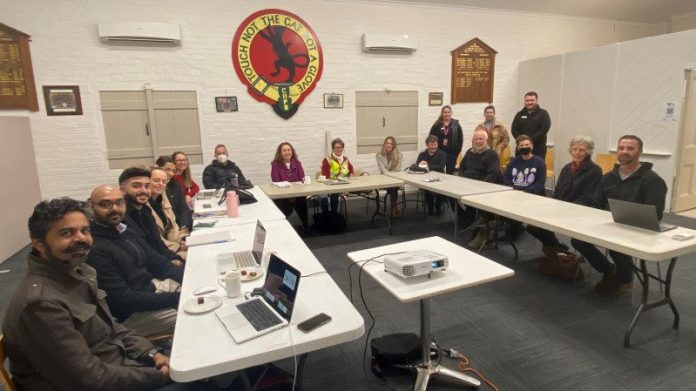
Mount Alexander Shire Council and the Country Fire Authority (CFA) hosted a workshop with key stakeholders from the Chewton community and RMIT and CSIRO researchers to discuss Evacuation Mapping for the region last week.
The round table discussion at the Castlemaine Botanical Gardens Tea Rooms was part of a broad ‘Community Based Bushfire Management’ program that the CFA are initiating in Chewton with a focus on enhancing disaster resilience.
This is a community-led, place-based approach to risk reduction that is part of the Victorian Government’s Safer Together program.
The workshop looked at an evacuation scenario in the township in the event of a bushfire on a day of extreme weather, what traffic would do and how the community would respond.
The modelling is being led by RMIT principal research fellow Dr Dhirendra Singh and Dr Erica Kuligowski an expert on modelling human behaviour in mass evacuation events.
Dr Singh said the workshop looked at a very specific scenario being an extremely hot Friday afternoon in February, where there were children in attendance at Chewton Primary, families at the local pool and lots of visitors at the popular swimming spot at Expedition Pass Reservoir. This scenario was co-designed with community input and local knowledge.
“We discussed what would happen if there was a fire in the landscape, how weather conditions would impact this and how traffic would respond in an emergency. We also looked at what would happen if a tree came down or there was an accident on one of the main roads and how this might impact the evacuation of the township,” Dr Singh said.
The RMIT and CSIRO team will now go away and collate all the data to create a computer model of the scenario and workshop participants will reconvene in two to three months to look at exactly what would happen in such an emergency, and how the community and emergency services can best prepare for such incidents.
Mount Alexander Shire Council’s emergency coordinator Luke Ryan said the modelling can be quite confronting but was crucial to provide an understanding of what can occur during such an emergency and the best way the community can be prepared.
Mr Ryan said the Victoria Police are the lead agency when it comes to evacuation and traffic management and they have tested the data around this but it is not current.
“We will also be seeking input from those unable to attend to create a new Traffic Management Plan. The modelling will help us to establish what went right and what went wrong and to fill those gaps and build resilience,” he said.
CFA Community Based Bushfire Management Facilitator Claire Collie thanked all the community stakeholders which took time to be part of the discussion and offered valuable knowledge and input on the area, including representatives from Mount Alexander Shire Council Luke Ryan and emergency management officer Zack Abbott, Cr Christine Henderson, members of the CFA, Chewton Primary, Dhelkaya Health, volunteers from the local Red Cross, the Chewton Pool committee, and the wider community.
“We thank everyone for their input and look forward to exploring the modelling and planning for future response and increased preparedness of the Chewton community,” Ms Collie said.
Anyone who would like to be involved in the Chewton CBBM project can email Claire for more information at Claire.Collie@cfa.vic.gov.au
Let’s take a look back at … Castlemaine Coach Factory
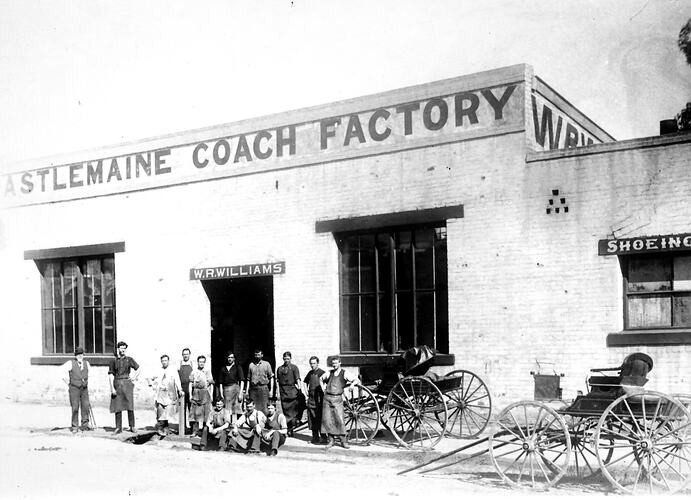
Then:
W. R. Williams Coach Builders (pictured) operated as a business for at least 68 years, from Forest Street.
He originally came to Castlemaine to fulfil a position in Mr. Myring’s coachbuilding shop near the gasworks. Mr. Gaulton purchased Mr. Myring’s business with Mr. Williams staying on as foreman. Shortly after, the business moved to Forest Street.
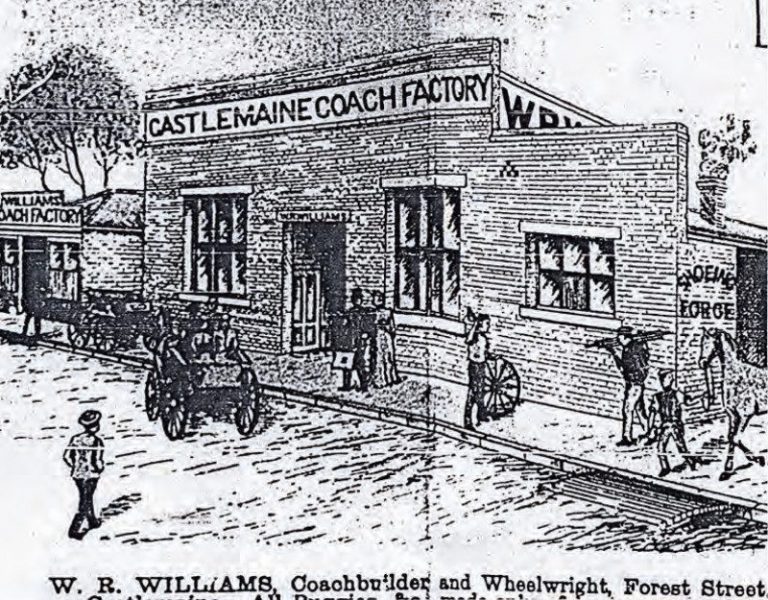
Production would have changed over their long period of operation from shoeing (4s. per set) and a forge in their early years to production and sale of buggies, gigs and all classes of vehicles, both light and heavy as per their advertisement in the ‘Mail’ in 1932. They imported regular stocks from England and America, which they displayed in the Showroom on the north side of Forest Street in the building now occupied by Graffiti Publications.
They also advertised the painting, upholstery and hoods of motor cars and vehicles and body builds on the premises. Williams was well-known throughout the Commonwealth and it was rare not to win a prize at shows where he has exhibited. He was a keen follower of sport and financially and personally supported many sporting bodies in the town. He was a judge at many Agricultural Shows, a captain of the Fire Brigade for 11 years and a pioneer member of the Rechabite Lodge. He died on September 3, 1917 – aged nearly 70. He had broken his leg 18 years prior and as it didn’t knit properly, he had needed to walk with a crutch or stick ever since. His son, John, had died in 1916 and this had had a marked effect on him. Image and information kindly supplied by the Castlemaine Historical Society – Exploring our Past.
Now:
The location of W. R. Williams showroom on the north side of Forest Street is now home to Graffiti Publications founded by local hot rod enthusiasts Larry and Mary O’Toole. It is fitting that the building still has a connection to Australian transport and motoring with Graffiti being the producers of the renowned Australian Street Rodding magazine.
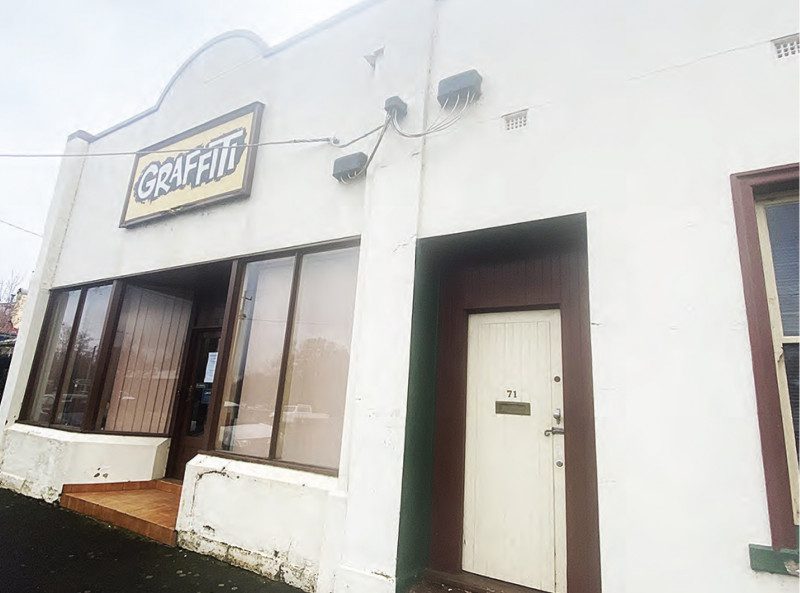
Graffiti are celebrating their 45th year in publishing in 2022 and have produced almost 400 editions since they started out back in 1977. They have also produced a wide array of other publications including Hot Rodding International and numerous books on the subject of hot rodding. The local business are also Australian distributors for a range of other highly sought after hot rod mags including American publications The Rodder’s Journal, Rodding USA and Wheel Hub, and Australian Hot Rodder produced fellow Aussie enthusiast and local Graham Smith.
You can explore the address with Google Street View here.
Maldon’s Ned Cameron honoured at annual memorial match

After another week-off with the bye the Maldon sides headed over to Carisbrook, in what was a very wet day, which again was set to be another hard contest for all teams.
This was also an important day for both club’s as it was the Ned Cameron Memorial game in memory of the late Ned Cameron played for both Maldon and Carisbrook in the Juniors.
Xavior Noy won the Ned Cameron medal for Maldon which was awarded by Ned’s family – the Lang family of Maldon – after the game which was a very special moment for both clubs.
With a lot of movements through the Senior Football teams with injuries the pressure was on to get those wins on the board.
Although there was the lingering pressure for both Senior Football sides they gave what they had to give, but unfortunately it wasn’t enough with the Seniors going down and the Reserves failing to keep their to keep their winning streak alive.
The Senior Netball teams all had very close games against a very eager and strong Carisbrook showcasing what finals may will like. Our Junior Football and Netball Teams all played hard with the Under 17s Football coming out with another great game and our Under 15s Netball backing it up for another win on the board. With only four games left before finals the club is shaping up to take a strong lead into the finals campaign.
This week Maldon take on Trentham at home which will be yet another big weekend of sport with Trentham Senior Football Teams taking the top place on the ladders and fighting to keep their places in the top 8 for the Senior Netball.
Maldon will sure be set to put on a hard fight. S2 Sport will also be at the game this weekend for all of your Club Merchandise needs, be sure to check it out! We are also hosting our Yobbo Lotto Function after the games which is set to be one to remember with a sell out of tables and we’re sure – some impressive outfits!
Triple treat to be unveiled at Castlemaine Art Museum

Local art enthusiasts can enjoy a triple treat at Castlemaine Art Museum (CAM) this evening as they officially launch three new offerings – Agri-Cultures, a projection commission by local artist Zoe Scoglio; Reflections #2; and the first in the 2022 Orbit exhibition series celebrating local artists – Gabrielle Martin’s Through the Long Grass.
The three new installations will be officially opened with a special event from 6pm tonight, July 29 at the Lyttleton Street gallery. All are welcome to attend.
CAM recently unveiled a new exhibition of works featured in the ‘Reflections on the Castlemaine Art Museum Collection’ email and website series.
Reflections began as part of CAM’s online response to the COVID-19 lockdowns. Contributors are asked to ‘reflect’ on works or objects from the CAM collections and history.
Some of these contributions have been published monthly in the Castlemaine Mail.
This is the second exhibition of the works featured in Reflections.
The night will also include the launch of the latest Terrace Projections installation Agri-Cultures by Zoe Scoglio.
This is also the second in the series and the first work specifically commissioned for the Terrace Projections initiative which sees the artists’ work projected onto the exterior wall of the gallery after nightfall.
Agri-Cultures is a video work in dialogue with local small-scale farmers Gung Hoe growers in response to the theme ‘Industry.’
Focusing on the manual labours and tactile relations, this is a visual portrait of the daily regenerative wholistic practices and emergent cultures at the Harcourt Organic Farming Co-op.
Zoe told the Mail that she was volunteering at the Harcourt Organic Farming Co-op when the commission opportunity arose and she was inspired to celebrate their work.
“It’s a very busy place so I just brought my camera along and did some light touching filming over the course of a few months and then edited the work together,” she said.
“It was an honour to learn more about the details of their daily practice and connection to land and to be able to share that with a wider audience,” she said.
Visitors can also enjoy an artist talk with Gabrielle Martin about her latest work Through the Long Grass at CAM tomorrow, Saturday, July 30 at 2pm.

Salvation Army Castlemaine strikes up the band

There was plenty of excitement at The Salvation Army Castlemaine’s Just Brass music group’s latest gathering after 26 brand new brass instruments finally arrived.
Just Brass is a free music program run by the Salvos in local primary schools under the guidance of experienced local music teachers.
The new instruments are the result of a series of fund raising concerts held in Castlemaine by brass quartet Brasslemaine, who donated all proceeds to the program.
Just Brass coordinator Dean Curtis said these instruments will make a massive difference.
“We’ve been getting by with older instruments with sticky valves and the occasional leak. This means that the students haven’t been able to play at their best. These new instruments will change that,” Mr Curtis said.
The Castlemaine Just Brass group travelled to Melbourne last Sunday to play with the polished Preston Salvation Army Band in a joint concert and enjoyed giving their new instruments a solid work out.




